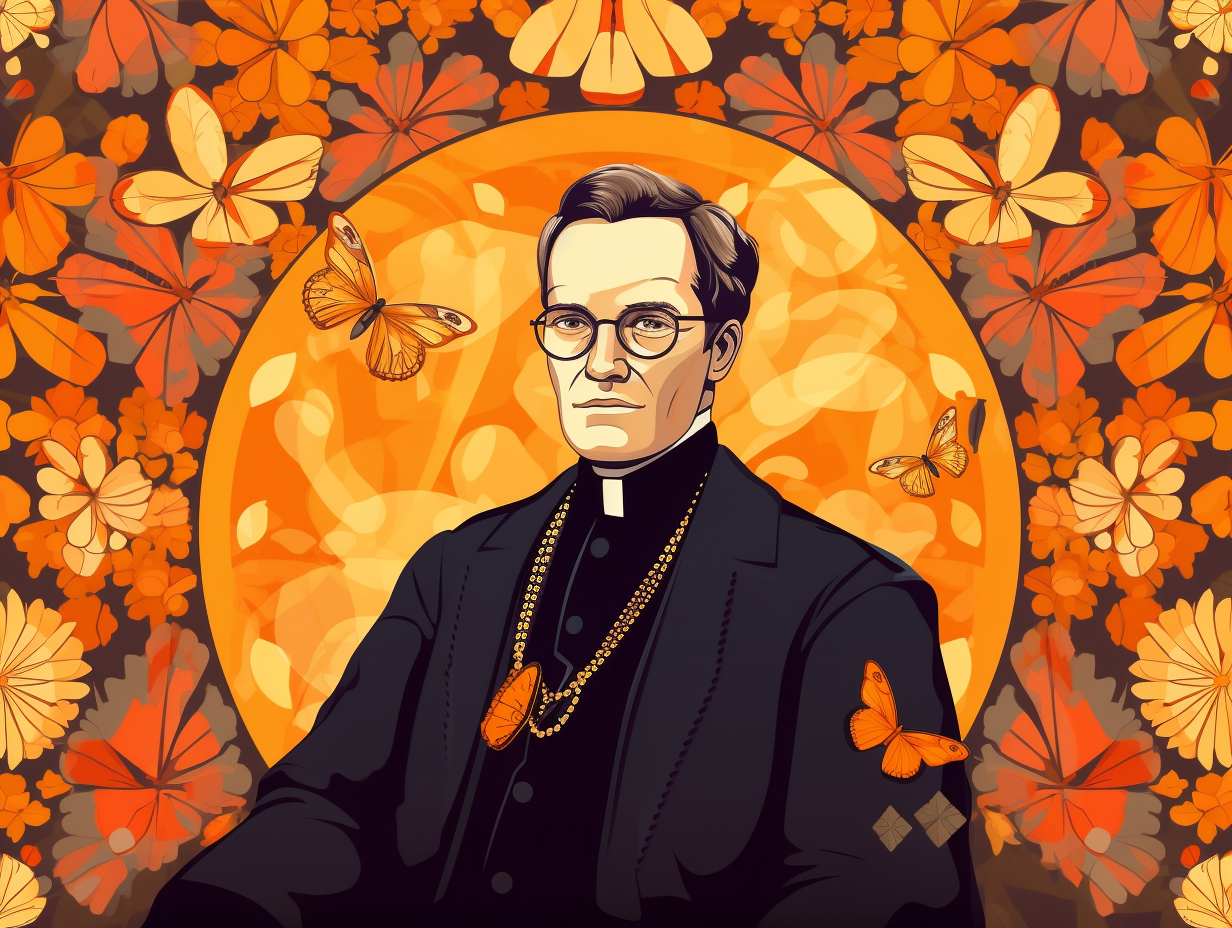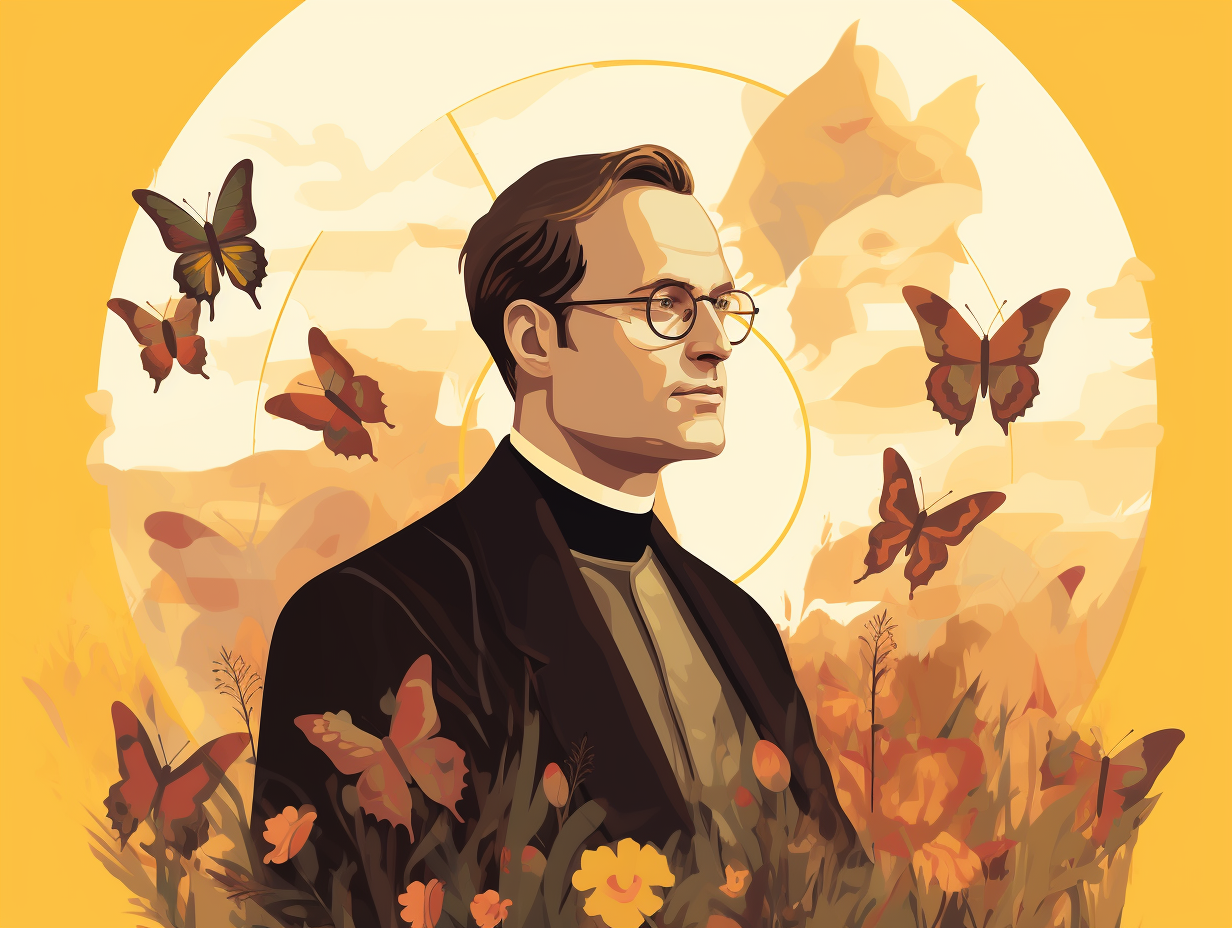Unlocking the Genetic Code: Top 13 Fun and Fascinating Facts About Gregor Mendel

1. Peas Unravel Genetics
Who says peas aren't worth spilling? Gregor Mendel certainly had a ball with them, unraveling the mystery of heredity like a champ: By studying pea plants, Mendel pioneered the concept of inheritance through discrete units and uncovered dominant and recessive traits and their independent inheritance, seeding the revolution in genetics as we know it today!
Source => genome.gov
2. Mendel's Pea-sage to Fame
Move pea-side, folks: the father of modern genetics, Gregor Mendel, was once just a humble monk who "pea-ned" his way to legendary status by investigating hereditary traits in, you guessed it, pea plants. But alas, such a peas-age to fame wasn't all smooth-sailing: in a strange twist of fates, his breakthrough work remained unrecognized during his lifetime, only to sprout to prominence a whole 16 years after he'd joined the great pea-patch in the sky.
Source => ncbi.nlm.nih.gov

Discover the surprising truth about our DNA similarities! 🧬 Just 0.1% genetic difference holds the key to unlocking personalized treatments for illnesses. Explore the wonders of our genetic code now! ✨
=> Fun Facts about Dna
3. Darwin's Missed Mendel Mail
You know that feeling of finding an important piece of mail buried under a pile of junk? Just imagine Charles Darwin experiencing that same feeling times a hundred – with the key to inheritance sitting right under his nose: In a shocking discovery after his death, Darwin's library contained an unread, unopened copy of Gregor Mendel's groundbreaking research on plant hybridization, which he had sent to about 100 scientists, and could have potentially changed the course of evolutionary studies.
Source => forbes.com
4. Beekeeping for Pollination Tricks
Before honeybees were busy making honey, they were busy making history – all thanks to a monk with a knack for genetics: Gregor Mendel, also a dedicated beekeeper, used his beekeeping expertise to understand the pollination process in his pea plant experiments, controlling the crossing of traits by directing the bees to specific flowers in his garden.
Source => pubmed.ncbi.nlm.nih.gov

5. Fruit Fly Genetics Squad
Holy fruit fly, Batman: It was not just Gregor Mendel who laid the foundation for modern genetic research, but the combined efforts of Thomas H. Morgan, Alfred H. Sturtevant, Hermann J. Muller, and Calvin B. Bridges in the early 20th century that made Drosophila melanogaster (the humble fruit fly) a crucial model organism, revealing that genes form linkage groups on chromosomes and are inherited in a Mendelian fashion.
Source => ncbi.nlm.nih.gov
6. Mendel: Monk, Geneticist, Beekeeper
Who said "Bee" prepared was just a scout's motto? It also applies to a famous geneticist with a penchant for honey-making buzzers: Gregor Mendel was not only a groundbreaking scientist but also a skilled beekeeper, using our striped friends to conduct experiments on genetics and heredity. By crossing different strains of bees and studying their traits, he was able to hone in on the laws of inheritance, much like his work with pea plants.
Source => britannica.com
7. Pea-ther of Genetics
Who says playing with peas can't lead to fame? Rolling in the deep of plant hybridization, Gregor Mendel quietly peas-ed together the foundation of modern-day genetics: Although he never boasted about making major discoveries in his paper "Experiments on Plant Hybridization," it wasn't until 16 years after his death that botanists uncovered his work and credited him with discovering the laws of heredity, including the Law of Segregation, the Law of Dominance, and the Law of Independent Assortment, forever stamping his name as the grand "Pea-ther" of genetics.
Source => forbes.com
8. Posthumous Secrets of a Pea Monk
Did you hear the one about the monk whose pea plants had stage fright? They waited until after he died to spill their secrets: Gregor Mendel's groundbreaking research on inheritance patterns in pea plants went unrecognized until years after his death, when scientists like William Bateson realized its importance and established the field of "genetics," based on Mendel's principles - securing his legacy as the father of modern genetics.
Source => nature.com
9. Mendel & Zawadzki Peas-ful Collab
Ever heard of a "pea-fessional" partnership? Well, it was all about pea plants and two brilliant minds: Gregor Mendel's genius and Aleksander Zawadzki's unwavering support led to over 28,000 pea plant experiments and the birth of modern genetics. No small feat for a peas-ful collaboration!
Source => en.wikipedia.org

10. Mendel's Mysterious Genetic Thriller
You can call Gregor Mendel the "forgotten protagonist" of the genetics world, starring in his own heredity-based mystery thriller, complete with lost papers, an unnoticed hero, and a posthumous rediscovery: Our leading man conducted groundbreaking research on genetic traits, only for his remarkable Laws of Heredity to be acknowledged long after his death. To add to the mystique, monks burned his personal papers, leaving modern scientists scratching their heads and wondering how Mendel reached those revolutionary conclusions! His story has all the makings of a Hollywood blockbuster, except it's an essential part of our understanding of genetic inheritance.
Source => dnaftb.org
11. Sweet Pea Revelation
Long before the pea-soup fog of great ideas, a garden monk had a "sweet pea" of a revelation: Gregor Mendel's ground-breaking experiments with pea plants uncovered the concept of dominant and recessive alleles, establishing the very foundation of modern genetics.
Source => www2.edc.org
12. Mendel's Rebellious Plant Experiments
Before Mendel peas-ed his way into genetic fame, he dabbled in some rebellious plant experiments that went against the grain: Mendel's lesser-known work with hawkweed revealed a rare phenomenon called apomixis, involving a mix of sexual and asexual reproduction found in certain plants and animals, highlighting the diverse and unpredictable nature of genetic patterns.
Source => bbvaopenmind.com
13. Wizard-Wannabe & Pea Potions
When Gregor Mendel wasn't busy being the lesser-known third cousin of Hufflepuff's Nearly Headless Nick, he was experimenting with peas as if they were a magical potion: This studious wizard-wannabe spent a decade analyzing over 27,000 plants in his quest to become the father of genetics and even used his magical touch in philanthropy by supporting his sister's children and countless low-income individuals with financial aid.
Source => em.muni.cz
Related Fun Facts




















